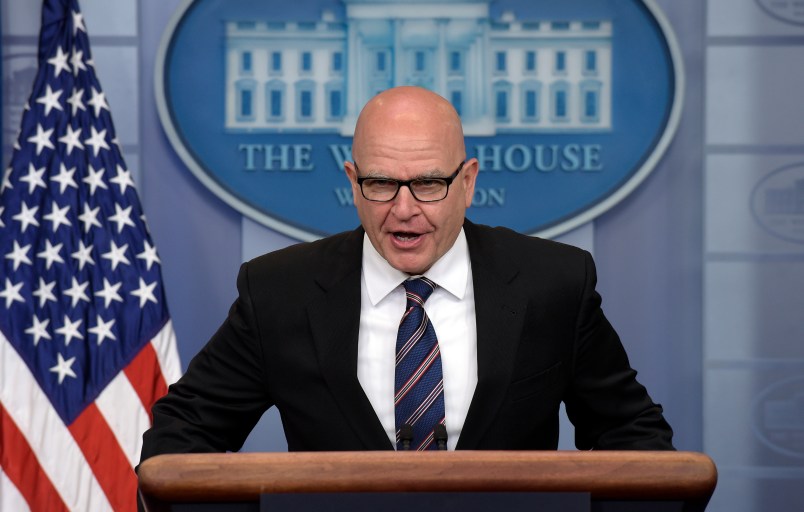National Security Adviser H.R. McMaster on Tuesday morning marched in lockstep with the larger Trump administration narrative on reports that the President disclosed highly classified information to Russian officials, insisting during a press briefing that nothing inappropriate was shared and that the “real issue” was leaks to the press.
Yet even as he defended the White House, McMaster revealed some telling details.
He did not deny that Trump shared classified information with senior Russian diplomats, and he divulged that Trump spontaneously shared details about an Islamic State threat with a country that the U.S. intelligence community agrees intervened in the 2016 presidential election to Trump’s benefit.
These are the key takeaways from McMaster’s turn at the briefing podium.
Trump made snap decision to share info
McMaster said that President Donald Trump made a spontaneous decision to share “code-word” information, the highest level of classification, during his conversation with Russian Foreign Minister Sergey Lavrov and Russian Ambassador Sergey Kislyak.
“When was the decision made to share that information with the Russians?” a reporter asked McMaster. “Did the President spontaneously, on the spot, decide to give that information over?”
“He made the decision in the context of the conversation,” McMaster said during the White House daily briefing, which he took over from Press Secretary Sean Spicer.
He called Trump’s remarks “wholly appropriate.”
“In the moment then, during the context of that conversation?” the reporter pressed.
McMaster declined to clarify further.
He also would not confirm or deny whether the information Trump shared with the Russian diplomats was classified, saying, “I will not be the one to confirm that information that could jeopardize our security.”
The CIA and NSA were warned about what Trump divulged
McMaster confirmed the Washington Post’s reporting that the CIA and NSA were contacted following the meeting, although he would not comment on why.
“If there was nothing the President shared that he shouldn’t have shared, why did they contact the NSA and CIA?” a reporter asked.
“I would say an overabundance of caution but I’m not sure,” McMaster said. “I’ve not talked to him about that. About why he reached out.”
The Post reported that Thomas Bossert, assistant to the President for homeland security and counterterrorism, called those agencies to try to contain the damage of Trump’s revelations. Bossert’s aide also requested that section of their conversation be stricken from internal memos, and that the full transcript of the meeting be shown only to a small circle of senior staffers, according to the Post.
Asked again why the NSA or CIA would be contacted, McMaster told reporters that he, Secretary of State Rex Tillerson and Deputy Adviser for National Security Dina Powell were in the room and did not feel that the conversation “was inappropriate.”
Trump was never briefed on where the info came from
The White House has repeatedly insisted that no “intelligence sources or methods” were divulged during the Oval Office meeting, offering a defense that goes beyond what the Post, CNN, New York Times and other outlets have reported. The stories instead allege that Trump’s disclosure of highly classified information, apparently without permission from the ally that provided it, could jeopardize a key source on the Islamic State and provide Russia insight into U.S. intelligence capabilities.
McMaster argued Tuesday that Trump could not have divulged such information even if he wanted to—because the President was never briefed on the sourcing.
“The President wasn’t even aware where this information came from,” McMaster told reporters. “He wasn’t briefed on the source or method of the information either.”
McMaster stands by his statement that WaPo’s story is “false”
The national security adviser has mostly avoided the spotlight since assuming his role, working behind the scenes to bring discipline to the administration’s unruly foreign policy apparatus. This came to an end Monday night, when he was sent out to give an on-camera statement in the White House driveway calling the Post story “false” and defending the President’s right to discuss terrorist threats with foreign countries.
When a reporter offered him the chance to clarify or correct that statement after Trump said on Twitter early Tuesday morning that he did indeed share “facts” with his Russian visitors, McMaster didn’t change course.
“I stand by my statement,” he replied. “The premise of that article is false.”
Leaks are the ‘real issue’ here!
In the clearest indication that McMaster had subsumed himself into the White House communications machine, the highly-respected general argued that the leaking of classified information to the press posed a graver danger to national security than whatever Trump discussed with Russian diplomats.
“The real issue, what I would like to see debated more, is national security has been put at risk by those violating confidentiality and those releasing information to the press that can be used connected with other information available to make American citizens and others more vulnerable,” McMaster told reporters.
In response to months of damaging stories about turmoil amid White House staff, Trump’s conversations with foreign leaders, and the ongoing investigation into whether Trump campaign staffers colluded with Russian officials who interfered in the U.S. election, the President has insisted that those leaks themselves are the “real news.”
As Trump infamously put it in February, “The leaks are real; the news is fake.”







“Turn off the lights. Turn them off!” McMasters added, as he ran toward a thick row of shrubbery.
Slimed!
In the blink of an eye, credibility gone. Poof!
One more formerly respected public servant flushes his reputation and integrity down the toilet for the sake of Trump. (I would say “sad” but lately I can’t bring myself to use this perfectly fine English word.)
Knowing this White House, DJT is probably the source of the leaks. Trying to prove to someone how smart and how much information he has.